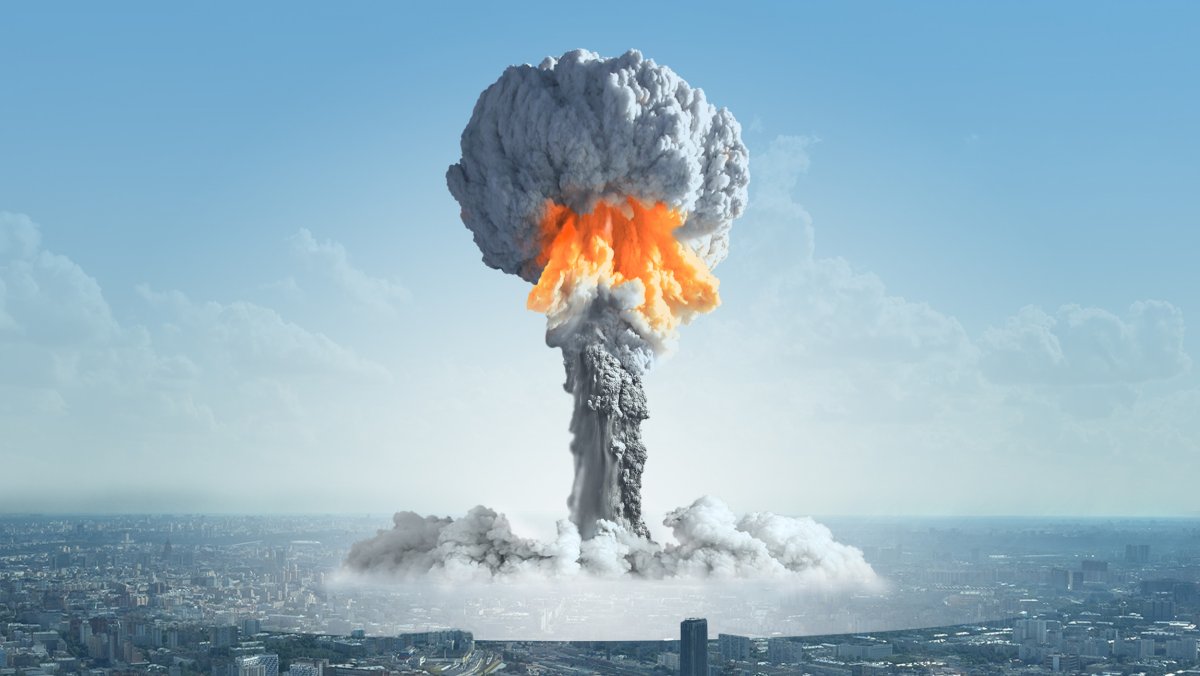The detonation of nuclear weapons may lead to worldwide famines, scientists have said.
In a paper published in the journal Nature Food, scientists considered how the soot ejected into the atmosphere as a result of nuclear bombs exploding may lead to mass food shortages.
They estimate that if the amount of soot entering the atmosphere exceeds 5 Tg (around 11 billion pounds), the sun would be blocked out so much that crop growth would be severely impacted in nearly every country.

According to the paper, a nuclear war between India and Pakistan could send between 5 and 47Tg of soot into the stratosphere. Even more devastating, a U.S.-Russian nuclear war may produce up to 150Tg of soot, causing a nuclear winter.
"The reduced light, global cooling and likely trade restrictions after nuclear wars would be a global catastrophe for food security," the authors wrote in the paper.
"More than 2 billion people could die from a nuclear war between India and Pakistan, and more than 5 billion could die from a war between the United States and Russia."
When a nuclear weapon is detonated, the immense amount of energy released vaporizes everything within a certain radius, depending on the power of the bomb. Close to the epicenter of the explosion, it can reach temperatures of up to 180,000,000 F. These widespread fires and destruction, combined with the atmospheric disturbance caused by the shockwaves of the bomb, would cause large amounts of soot and other aerosols to be carried away by the atmosphere around the globe, blocking out sunlight.
Crops need sunlight to grow, with productivity dropping as a result of decreasing sunlight levels. The authors predicted that in an extreme 150 Tg scenario, we would fall short on worldwide calories required by 74 percent. For reference, adult women require between 1,600 and 2,400 calories a day, and men need 2,000 to 3,000.
The Food and Agriculture Organization of the United Nations reported in 2010 that 51 percent of global food calories comes from cereals (which include wheat, rye, rice, oats and maize), 31 percent from vegetables, fruit, and other plant-based products, and 18 percent from animal products like meat, dairy and eggs.
In a commentary on the original paper, also published in Nature Food, Deepak K. Ray wrote that a 55.6 F global cooling would be seen in the wake of a nuclear war.
"In the extreme scenario the death toll will be the combined population of the United States, Europe, Russian Federation and allies and much more," he tells Newsweek.
Crop failure due to atmospheric pollution has previously occurred, usually due to enormous volcanic eruptions shooting huge amounts of ash and sulphuric acid aerosols into the air. This was seen in the aftermath of the 1815 Tambora eruption in Indonesia, which led to what was dubbed the "year without a summer" in 1816. On a larger scale, the dinosaurs and three-quarters of all other species were wiped out around the globe due to a worldwide nuclear winter of sorts caused by a 9-mile asteroid colliding with the planet.
"Large volcanic eruptions like Tambora will likely have the global effect of a limited nuclear war between India and Pakistan. An asteroid of the size that wiped off the dinosaurs (and the mass extinction) is probably akin to the scale of all-out mutually assured destruction," Ray says.
The authors of the paper do explore potential methods to lessen the blow on calorie supplies across the world in the case of a nuclear war.
"Adaptation measures such as food waste reduction would have limited impact on increasing available calories, '' wrote the authors.
Their models showed that using crops usually grown as livestock feed as human food could potentially offset food losses locally, but globally may not have much impact on the total amount of available food. They also predicted that reducing household food waste may help preserve lost calories in the case of a small nuclear war, but not in a larger war.
Nuclear bombs, regardless of their impact on the atmosphere, also kill huge numbers of people directly and via radiation sickness after exposure to fallout. This subsequent reduction in worldwide population may lessen the pressures on the food industry somewhat, although it's hard to predict due to the number of unknowns.
"Suppose that the bombs fell in uninhabited areas then there will be fewer deaths and yet the soot will lead to famine and subsequent deaths—that's the type of scenario being explored," Ray said. "But the authors have to do a more realistic scenario analysis in the future and just like your question, when I reviewed this work I told them the same."
Uncommon Knowledge
Newsweek is committed to challenging conventional wisdom and finding connections in the search for common ground.
Newsweek is committed to challenging conventional wisdom and finding connections in the search for common ground.
About the writer
Jess Thomson is a Newsweek Science Reporter based in London UK. Her focus is reporting on science, technology and healthcare. ... Read more





